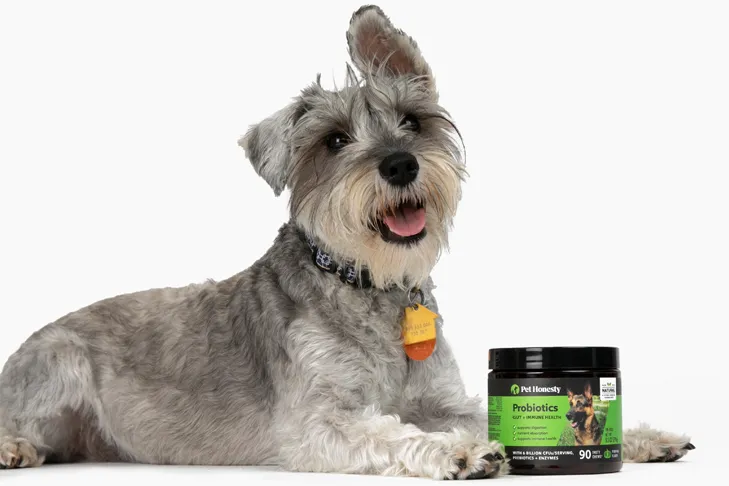Yeast infections can make your dog’s life miserable, causing itchy, inflamed skin, greasy coats, and foul odors like sour milk. These common issues often stem from allergies, poor diet, or antibiotic overuse, hitting dogs with sensitive skin hardest. If you’re searching for probiotics for dogs to help with yeast infection, you’re on the right track—veterinarians frequently recommend them alongside diet changes and treatments to restore balance and prevent recurrence. Probiotics introduce beneficial live microorganisms that support gut, skin, and ear health, creating an environment where harmful yeast struggles to thrive.
This guide draws from expert insights, including those from Dr. Amy Attas, VMD, of City Pets in New York, and trusted sources like the American Kennel Club (AKC). We’ll cover causes, benefits, how probiotics work against yeast, and smart buying tips to keep your pup comfortable and healthy.
Understanding Yeast Infections in Dogs
Yeast, a type of fungus, naturally lives in small amounts on your dog’s skin, ears, and mucous membranes. Problems arise when it overgrows due to imbalances from allergies, bacterial infections, high humidity, or long-term antibiotics. Dogs with allergies are especially prone, as their compromised skin barriers allow yeast to flourish.
Common signs include ear scabbing, waxy discharge, head tilting, balance issues, hair loss, and that distinctive yeasty smell. Early intervention is key—untreated infections can lead to chronic issues. For related skin support, check out the best wet dog food for skin and coat, which complements probiotics by providing essential nutrients.
 Biewer Terrier laying down outdoors at the park.
Biewer Terrier laying down outdoors at the park.
Vets often start with a full diet review and may prescribe oral or topical meds. But to tackle the root cause, probiotics for dogs to help with yeast infection play a starring role by replenishing “good” bacteria disrupted by these factors.
Why Probiotics Matter for Your Dog’s Microbiome
Every dog hosts a microbiome—a community of bacteria, fungi, and viruses influencing digestion, immunity, and skin health. Poor diets high in carbs or toxins can disrupt this balance, letting yeast dominate. Probiotics, non-pathogenic live microbes like certain yeasts and bacteria, step in to restore harmony.
“They behave like the good bacteria in a dog’s gut,” explains Dr. Attas. These strains must survive stomach acid to colonize the intestines, aiding vitamin production and nutrient absorption from food. Research from the National Institutes of Health supports their role in canine health, much like in humans.
Probiotics shine post-antibiotics, when “good” bacteria are wiped out, paving the way for yeast. Safe for weaned puppies (but not nursing ones, to avoid interfering with mother’s milk), they promote overall vitality.
Key Benefits of Probiotics for Yeast-Prone Dogs
Available over-the-counter at pet stores or online, probiotics don’t need prescriptions but warrant a vet chat first. Beyond gut balance, they offer:
- Enhanced nutrient absorption for better energy and coat health
- Reduced allergy symptoms and inflammation
- Stronger digestive function to prevent loose stools
- Inhibition of yeast and bad bacteria growth
- Boosted immunity against infections
- Relief for inflammatory bowel disease (IBD) or colitis
- Improved skin, fewer ear issues, and happier demeanor
Owners report shinier coats and fewer vet visits. For breeds like Yorkies, pairing with healthy dog food for yorkies amplifies results.
Strains like Lactobacillus acidophilus produce lactic acid, acidifying the gut to deter yeast reproduction. Bifidobacteria similarly crowd out pathogens. Even some E. coli strains or Saccharomyces yeast act as probiotics for diarrhea relief.
 Pet Honesty product image
Pet Honesty product image
How Probiotics Specifically Combat Yeast Overgrowth
Probiotics foster a yeast-hostile environment in the gut, ears, skin, and mucous membranes. Normal bacteria compete fiercely, preventing yeast colonization. “It’s inhospitable to yeast when good bacteria dominate,” Dr. Attas notes.
Post-antibiotics, they rebuild flora fast, slashing secondary infection risks. For ear-focused prevention, consider supplements to prevent ear infections in dogs, often probiotic-enhanced.
In humid climates or allergy seasons, consistent use maintains pH balance. Studies, like those in the Merck Veterinary Manual, affirm probiotics reduce yeast infection likelihood in dogs.
Essential Tips for Choosing and Using Dog Probiotics
Pick Dog-Specific Formulas
Human probiotics won’t cut it—bacterial strains differ due to evolutionary divergence. Opt for canine-labeled liquids, powders, or capsules with dog-safe flavors. Avoid xylitol or toxic sweeteners common in people products.
Choose Reputable Brands with Multiple Strains
Unregulated by the FDA, quality varies. Seek NASC-certified or vet-recommended options from trusted makers, verifying label claims via third-party testing. Multi-strain blends outperform singles.
Some kibbles tout probiotics, but concentrations are often too low. Pair a complete, balanced diet with a dedicated supplement instead.
 Berger Picards laying down together in a field.
Berger Picards laying down together in a field.
Follow Storage and Dosing Instructions
Live organisms demand care: refrigerate if required, heed expiration dates, and dose precisely (e.g., by CFU count). Introduce gradually alongside diet changes to monitor tolerance. For tear stain issues tied to yeast, the best probiotic for dog tear stains can be a targeted add-on.
Dr. Attas highlights emerging research: “Anecdotally, dogs show better appetite, firmer stools, healthier skin, and fewer infections from these food supplements.”
Final Thoughts on Probiotics for Yeast Relief
Yeast infections disrupt your dog’s comfort, but probiotics offer a natural, effective defense by balancing the microbiome and curbing overgrowth. Combine with allergy management, quality nutrition, and vet guidance for lasting results. Always consult your veterinarian before starting, especially for pups or dogs on meds.
Ready to help your furry friend? Explore more on our site and share your probiotic success stories in the comments.
References
- American Kennel Club (AKC): Probiotics for Dogs
- Dr. Amy Attas, VMD, City Pets: Expert interview insights
- Merck Veterinary Manual: Fungal Infections in Dogs
- National Institutes of Health: Bifidobacteria studies (PMC4908950, PMC7344949)
